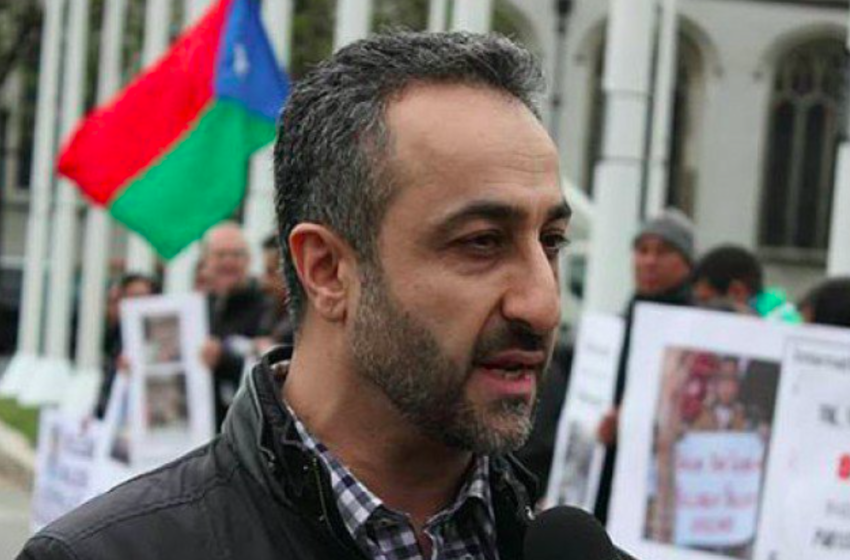Indian State Should Focus on Unconventional Methods: Jamal Nasir Baloch
Interview: Balochistan Leader Discusses National Struggle and Geopolitical Challenges

LONDON: Pro-freedom Baloch leader Hyrbyair Marri, the president of the Free Balochistan Movement, recently provided critical insights into the historical and contemporary challenges facing Balochistan, a region divided among Iran, Pakistan, and Afghanistan. In a detailed interview with Nathan Greppi, Marri emphasized that the Baloch are not a minority but a distinct nation with a unique cultural identity, language, and historical significance.
Marri outlined Balochistan’s tumultuous history, noting that the region, historically referred to as “Gedrosia” by ancient Greeks, served as a strategic crossroads between South Asia and the Middle East. He explained that Balochistan maintained its territorial integrity until the British Empire’s invasion in 1839, which led to a systematic dismemberment of the region. He described the 19th-century partition, which ceded parts of Balochistan to Persia (now Iran), Afghanistan, and the British-controlled territories, as an unjust betrayal of the Baloch people by their colonial rulers.
Following World War II and the subsequent decolonization, the eastern part of Balochistan was incorporated into the newly formed Pakistan. Marri said that one of Pakistan’s first acts as a UN member was the illegal invasion and annexation of Balochistan, a claim he maintains has never been accepted by the Baloch nation.
Marri clarified that the Baloch are not merely a minority within Iran but a historical nation. He drew parallels between the Baloch struggle and European resistance during the Nazi occupation, adding that just as the French and Poles were not considered minorities during the occupation, neither should the Baloch be categorized in such a way. He emphasized their long-standing presence in their ancestral homeland, where they have been the majority for millennia.
Marri highlighted the recent unrest in Iran following the murder of a Kurdish Girl Jina (Mahsa) Amini by Iran’s morality police in 2022, which sparked widespread protests. He pointed to the brutal treatment of the Baloch by Iranian authorities, particularly in response to their demands for justice. Notably, he mentioned the tragic incident involving a 15-year-old Baloch girl who was raped by a senior police officer, leading to widespread outrage and protests across Balochistan.
The interview also touched on the “Bloody Friday” incident, where Iranian Revolutionary Guard Corps forces violently suppressed peaceful protests in Zahedan, resulting in over 100 civilian deaths. Marri described these events as part of a broader narrative of systematic oppression against the Baloch people, who face execution and persecution under Iran’s judicial system.
The Baloch leader also strongly criticised China’s economic involvement in Balochistan through initiatives like the China-Pakistan Economic Corridor (CPEC). He characterised this partnership as exploitative, emphasising that it not only benefits China and Pakistan but also exacerbates the suffering of the Baloch population. He described Gwadar, the centre of CPEC, as a “prison city” where locals are subjected to surveillance and control, with their rights stripped away to facilitate foreign investment and resource extraction.
Marri also expressed concerns about the demographic changes in Gwadar, warning that the influx of settlers—primarily from China—threatens to outnumber and marginalise the indigenous Baloch population. He articulated that this demographic shift, alongside ongoing repression, forms part of a deliberate strategy to extinguish the Baloch national identity.
When asked about the ongoing conflict between Israel and Iranian-backed groups, Marri firmly condemned Iran’s theocratic regime and its proxies, such as Hezbollah and the Houthis. He noted that these groups act as extensions of the Iranian regime’s oppressive policies, working against the aspirations of nations like the Baloch, Kurds, and Arabs, who seek freedom.
Marri said that an independent Balochistan would never allow its territory to be used as a base for attacks against other nations, including Israel.
Hyrbyair Marri also discussed the Balochistan Liberation Charter as a vision and guideline for a future independent Balochistan as a secular and democratic state. He explained that the Baloch nation is diverse, with various beliefs and opinions, making secularism essential for ensuring equal rights for all citizens. He underscored the importance of democracy in celebrating this diversity and providing every Baloch citizen a voice in shaping their future.
Looking towards international relations, Marri wanted to build partnerships based on mutual respect with all nations, including Israel and Western states. He highlighted the potential for collaboration in areas such as agriculture and technology, citing Israel’s expertise in precision agriculture and water management as a model that could help transform Balochistan’s arid landscape.
Through his advocacy, Marri aims to raise global awareness of the Balochistan struggle for independence and to position the Baloch nation within the broader context of regional geopolitics. He called for solidarity from the international community to support the Baloch people’s quest for freedom and justice, framing their fight as integral to the fight against oppression in the region.
CLICK HERE TO READ THE FULL INTERVIEW OF MR MARRI.









